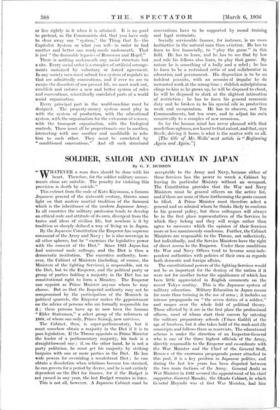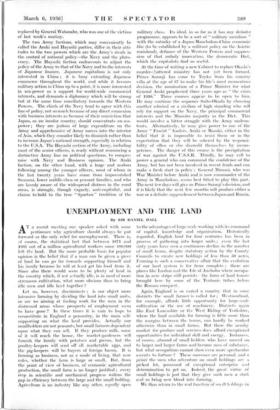SOLDIER, SAILOR AND CIVILIAN IN JAPAN
By G. F. HUDSON " WHATEVER a man does should be done with his heart. Therefore, for the soldier military amuse- ments alone are Suitable. The penalty for violating this 'provision is death by suicide."
' This extract from the code of Kato Kiyomasa, a famous Japanese general of the sixteenth century, throws some light on that austere martial tradition of the Samurai which is the inheritance of the modern Japanese Army. In all countries the military profession' tends to de' elop an ethical code and attitude of its own, divergent from the tastes and ideas of civilian life, but nowhere is it by tradition so sharply defined a way of living as in Japan.
By the Japanese Constitution the Emperor has supreme command of the Army and Navy ; he is also sovereign in all other spheres, but he " exercises the legislative power with the consent of the Diet." Since 1925 Japan has had universal male suffrage, and the Diet is thus a democratic institution. The executive authority, how- ever, the Cabinet of Ministers (including, of course, the Ministers of the fighting Services), is responsible, not to the Diet, but to the Emperor, and the political party or group of parties holding a majority in. the Diet has no constitutional right to form a Ministry. The Emperor can appoint as Prime Minister anyone whom he may choose. But so that the Imperial authority may not be compromised by the participation of the Monarch in political quarrels, the Emperor makes the appointment on the advice of persons who are formally responsible for it ; these persons have up to now been the famous " Elder Statesmen," a select group of the reformers of 1868, of whom one only, Prince Saionji,,pow survives.
The Cabinet, then, is super-parliamentary, but it must somehow obtain a majority in the Diet if it is to pass legislation. If the Throne appoints as Prime Minister the leader of a parliamentary majority, his task is a straightforward one ; if, on the other hand, he is not a party politician, he must get his majority by striking bargains with one or more parties in the Diet. He_has wide powers for overriding a recalcitrant Diet ; he can obtain a dissolution when relations become too strained, he can govern for a period by decree, and he is not entirely dependent on' the Diet for finance, for if the Budget is not passed in any year, the last Budget remains in force.
This is not all, however. .A Japanese Cabinet must be acceptable to the Army and Navy, because either of these Services has the power to wreck a Cabinet by , leaving its *particular Ministry without War occupant. The Constitution provides , that the War and Navy Ministers must be. general officers on thg active list, and if there are none of these forthcoming the posts cannot be filled. A Prime Minister must therefore select a general and an admiral whom he thinks likely to conform to. his general -policy, 'but these colleagues will always be in the first place representatives of the Services to which they belong and they will resign rather than agree to measures which the opinion of their Services more or less unanimously condemns. Further, the Cabinet Ministers are responsible to the Throne, not collectively, but individually, and the Service Ministers have the right of direct access to the Emperor. Under these conditions the War and Navy Offices tend to become semi-inde- pendent authorities with policies of their own as regards both domestic and foreign affairs.
The constitutional powers of the fighting Services would not be so important for the destiny of the nation if it were not for another factor the significance of which has been little appreciated in English comments on the recent Tokyo mutiny. This is the Japanese system of military education. Military Education in Japan means far more.than training in the use of arms ; it includes an intense propaganda on " the seven duties. of .a soldier," and ranges over the whole field of political theory. Those affected by it are in the first place the professional officers, most of whom start their careers by entering the military preparatory schools (YOnen GakkO) at the age of fourteen, but it also takes hold of the rank-and-file conscripts and follows them as reservists. The educational scheme is under the direction of an Inspector-General who is one of the three highest officials a the Army, directly responsible to the Emperor and co-ordinate with the War Minister and the Chief of the,,General Staff. Hecate e of the enormous propaganda power attached to this post. it is a key position in Japanese politics, and during the last few years has been disputed between the two main factions of the Army. Gene,ral, Araki as War Minister in 1932 secured the appointment of his chief supporter, General Mazaki ; the Qkada Cabinet, in which General Hayashi was at first War Minister. had him replaced by General Watanabe, who was one of the victims of last week's mutiny.
The two Army factions, which may conveniently be called the Araki and Hayashi parties, differ in their atti- tudes to the two powers which are the Army's rivals in the control of national policy—the Navy and the pluto- cracy. The Hayashi faction endeavours to adjust the policy of the Army to that of the Navy and to the interests of Japanese finance. Japanese capitalism is not only interested in China ; it is busy extending Japanese commerce throughout the world, and while it favours military action in China up to a point, it is more interested in sea-power as a support for world-wide commercial interests, and demands a diplomacy which will be strong but at the same time conciliatory towards the Western Powers. The chiefs of the Navy tend to agree with this line of policy, not so much because of any direct connexion with business interests as because of their conviction that Japan, as an insular country, should concentrate on sea- power ; they arc jealous of large expenditure on the Army and apprehensive of Army moves into the interior of Asia, which they consider likely to diminish rather than to increase Japan's national strength, especially in relation to the U.S.A. The Hayashi section of the Army, including most of the senior officers, is ready without renouncing a distinctive Army line on political questions, to compro- mise with Navy and Business opinion. The Araki faction, on the other hand, with a large and zealous following among the younger officers, most. of whom in the last twenty years have come from impoverished Samurai, lower middle-class or peasant families, and who are keenly aware of the widespread distress in the rural areas, is strongly, though vaguely, anti-capitalist, and claims to hold to the true " Spartan " tradition of the military class. Its ideal, in so far as it has any definite programme, appears to be a sort. of " military socialism " with the autarky of a Japan-Manchukuo-China economic bloc (to be established by a militant policy on the Asiatic mainland), defiance of the Western Powers and suppres- sion of that unholy innovation, the democratic Diet, which the capitalists find so useful.
At the time of writing a new Cabinet to replace Okada's murder-:'uttered ministry has not yet been formed. Prince Saionji has come to Toyko from his country villa at the age of 87 to make his life's most momentous decision, the nomination of a Prime Minister for what General Araki prophesied three years ago as " the crisis of 1936." Three courses appear to be open to him. He may continue the sequence Saito-Okada by choosing another admiral or a civilian of high standing who will rely for support on the Navy, the principal commercial interests and the Minseito majority in the Diet. This would involve a bitter struggle with the Army malcon- tents. Alternatively, he may give power to one of the Army " Fascist " leaders, Araki or Mazaki, either in the belief that it is impossible to resist them or in the expectation that they will be sobered by the responsi- bility of office or else discredit themselves by incom- petence. The danger of this course is the precipitation of war against the U.S.S.R. Thirdly, he may call to power a general who can command the confidence of the Army, but has not been involved in recent feuds and can make a fresh start in policy ; General Minami, who was War Minister before Araki and is now commander of the Army in Manchukuo, seems best fitted to play this part. The next few days will give us Prince Saionji's decision, and it is likely that the next few months will produce either a war or a definite rapprochement between Japan and Russia.

















































 Previous page
Previous page